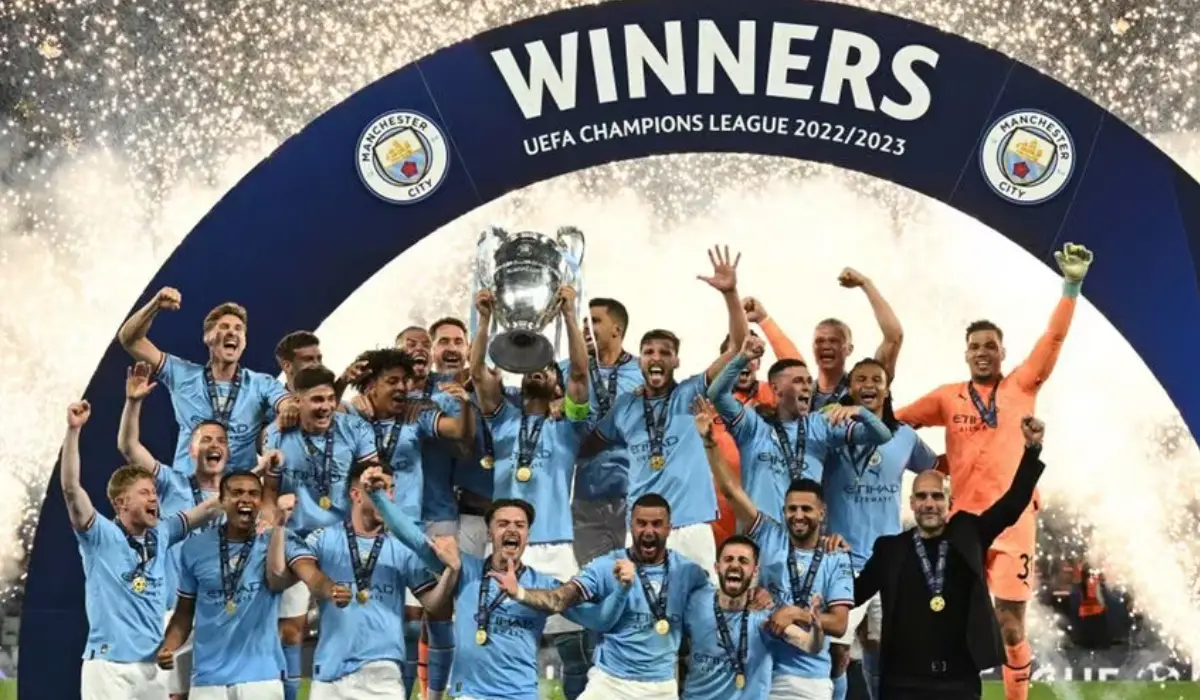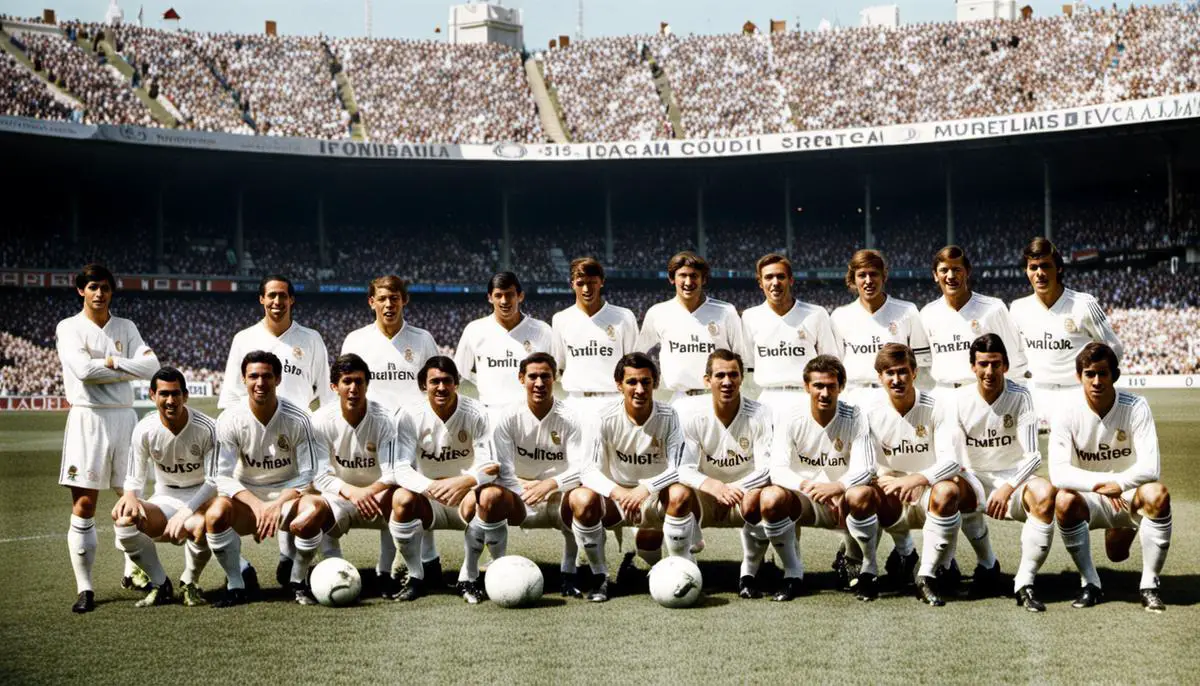The UEFA Champions League is a big deal in the world of soccer. People all around the world love watching it, and there’s a good reason for that. In this article, we’ll take a closer look at why UEFA Champions League is so popular. Understanding this can give us insights into what makes this tournament really special. So, let’s dive in and find out why people can’t get enough of it!
Compare: Premier League vs Champions League Prize Money
Stats That Prove That UEFA Champions League is So Popular
- The UEFA Champions League consistently ranks among the most-watched sporting events globally. For example, the 2020 final between Paris Saint-Germain and Bayern Munich attracted over 380 million viewers worldwide.
- The official UEFA Champions League Instagram account gained over 25 million new followers during the 2020-2021 season, indicating a significant level of engagement and interest from fans across the globe.
- The 2019 final between Liverpool and Tottenham Hotspur, for example, was estimated to have been watched by around 1.1 billion people worldwide, underscoring the competition’s ability to captivate audiences on a global scale.
- Champions League matches often draw large crowds. For example, the 2018 final in Kyiv, which featured Real Madrid and Liverpool, had an attendance of approximately 61,000 spectators.
- The Champions League consistently records high TV ratings across various markets. For instance, the final match in the 2021 season had a TV viewership rating of over 34% in the United Kingdom, highlighting its popularity in football-loving countries.
- Also, the tournament’s matches are broadcast in over 200 territories worldwide, ensuring that fans from diverse regions have access to the games.
These statistics collectively showcase the widespread appeal and immense popularity of the UEFA Champions League among football fans around the world.
Still, you may wonder why the UEFA Champions League is so popular.
(Read Also: Why Real Madrid Never Won A Treble)
10 Main Reasons Why UEFA Champions League Is So Popular
The UEFA Champions League’s popularity can be attributed to several main reasons but 10 are highlighted here.
1. High-Quality Football
The UEFA Champions League’s enduring popularity is largely rooted in the promise of consistently high-quality football that captivates fans worldwide. The tournament gathers the finest football clubs from Europe, ensuring that every match is a showcase of top-tier talent, skill, and tactical brilliance.
In the Champions League, football enthusiasts are treated to intense clashes between elite teams, resulting in thrilling encounters that often transcend regular league matches. The competitive nature of the tournament compels clubs to bring their A-game, leading to performances characterized by fast-paced action, intricate passing, and goal-scoring prowess.
For instance, matches featuring clubs like FC Barcelona and Real Madrid have become synonymous with exquisite ball control, breathtaking dribbles, and strategic playmaking. Such high-calibre teams consistently provide moments that leave fans in awe, whether it’s Lionel Messi’s mesmerizing runs or Cristiano Ronaldo’s goal-scoring finesse.
Moreover, the Champions League format demands a level of excellence that ensures even the slightest lapse in concentration can lead to defeat. This requirement pushes players to deliver their best, resulting in closely contested battles where individual brilliance and team cohesion are crucial.
Historic moments like Liverpool’s astonishing comeback against AC Milan in 2005 final, where they overcame a 3-0 deficit to win the trophy, exemplify the drama and excitement that high-quality football in the Champions League can generate.
Consider Reading: How Real Madrid Make Money
2. Elite Club Teams
The UEFA Champions League’s allure is significantly heightened by the participation of elite club teams, which contributes to the competition’s extraordinary popularity. The tournament brings together the most prestigious and successful football clubs from across Europe, creating a unique platform for these giants to clash and assert their dominance on a grand stage.
For instance, clubs like Real Madrid and Bayern Munich are synonymous with football excellence, boasting rich histories and extensive trophy cabinets. Their participation in the Champions League amplifies the tournament’s prestige and draws attention from fans globally. The anticipation of witnessing these powerhouses face off against each other is a major driver of the competition’s popularity.
Furthermore, the presence of elite club teams introduces captivating storylines. The age-old rivalry between Barcelona and Real Madrid, often referred to as “El Clásico,” adds a layer of intense excitement to the competition. These matchups extend beyond local bragging rights; they symbolize the battle for supremacy on both national and continental levels.
The participation of elite clubs also ensures that the tournament is a showcase for football’s brightest stars. Players like Cristiano Ronaldo, Lionel Messi, and Neymar represent not only their respective clubs but also embody the spirit of competition and excellence that defines the Champions League. Their performances in the tournament become part of football’s legacy, with every goal and assist etching their names in history.
Read Also: Why Real Madrid Are Called Los Blanco?
3. Historical Significance
The historical significance of the UEFA Champions League plays a pivotal role in its enduring popularity, creating a sense of legacy and tradition that resonates deeply with football enthusiasts. The tournament’s rich history, dating back to its inception in 1955, is peppered with iconic moments and legendary teams that continue to shape the competition’s narrative.
Take, for instance, the “Miracle of Istanbul” in the 2005 final, where Liverpool staged an incredible comeback against AC Milan after being 3-0 down at halftime. This historic feat not only secured Liverpool’s fifth European title but also etched an indelible mark in football lore, illustrating the unpredictable drama that the Champions League can deliver.
Furthermore, the tournament’s historical backdrop includes memorable clashes between historic clubs. Matches like the 1999 final, where Manchester United secured an astonishing last-minute victory against Bayern Munich, remain etched in fans’ memories as an embodiment of the competition’s ability to produce heart-stopping moments.
The Champions League’s evolution is also a testament to its historical importance. The shift from a knockout-only format to incorporating group stages reflects football’s changing dynamics and the desire to showcase consistent performance over a season. This transition has added layers of strategy and intensity to the tournament, culminating in more gripping matches.
Additionally, the emergence of clubs from smaller footballing nations, like Porto’s triumph in 2004, highlights the tournament’s inclusivity and potential for underdog stories. These historic victories remind fans that the Champions League isn’t solely the domain of established giants but a platform for diverse clubs to make their mark.
4. The Thrill of International Matchups
One of the core reasons why the UEFA Champions League is popular lies in its unique ability to offer captivating international matchups. The tournament brings together football clubs from various European nations, creating an electrifying blend of styles, strategies, and national pride that resonates deeply with fans worldwide.
These international matchups go beyond mere club rivalries; they symbolize the clash of footballing cultures. When a Spanish powerhouse like Barcelona faces off against an English titan like Manchester City, it’s not just a game – it’s a showdown between distinct footballing philosophies and histories.
Fans relish the opportunity to witness stars from different countries competing on the same stage. The Brazilian flair of Neymar against the German precision of Thomas Müller, or the Dutch creativity of Matthijs de Ligt pitted against the Italian defensive prowess of Giorgio Chiellini – these matchups showcase the diversity of talent that the Champions League draws together.
Additionally, international matchups intensify the anticipation for the tournament. Fans eagerly await the draw to see which teams from different leagues will go head-to-head. The unpredictability of these pairings fuels debates and discussions, adding an extra layer of excitement to the tournament’s buildup.
Furthermore, the Champions League often presents the chance for clubs to avenge national rivalries. When two clubs from historically rival nations meet, the encounter holds extra significance, resonating with fans who relish the opportunity to see their country’s football pride represented on a grand stage.
5. The Magnetism of Star Power
The prominence of star power is a key factor driving the popularity of the UEFA Champions League. In this context, star power refers to the presence of globally renowned football players who not only excel on the field but also carry a magnetic appeal that draws fans from all corners of the world.
When the likes of Lionel Messi, Cristiano Ronaldo, or Kylian Mbappé step onto the Champions League stage, they bring with them an aura of excitement and anticipation. These players are not just athletes; they are icons whose performances transcend the sport itself. Their skills, charisma, and impact extend beyond the 90 minutes of play, shaping the narrative of the tournament.
Fans are captivated by the prospect of witnessing these superstars showcase their talents on such a prestigious platform. Moments of brilliance, like a Messi free-kick or a Ronaldo overhead kick, resonate beyond the immediate match, becoming topics of conversation, highlights, and memes that populate the digital world.
Star power also amplifies the tournament’s global reach. When a fan from Asia or Africa tunes in to watch a Champions League match, they are often drawn by the allure of seeing their favourite international players in action. This broadens the tournament’s appeal, making it a truly international event that bridges cultures and continents.
Moreover, star players elevate the stakes of the competition. A match that features two legendary players facing off generates heightened interest and anticipation. When Messi’s Barcelona meets Ronaldo’s former club Manchester United, it’s not just a clash of teams; it’s a showcase of individual brilliance that transcends team loyalty.
6. The Charm of Cinderella Stories
One big reason why the UEFA Champions League is so loved is because of the “Cinderella stories.” This means when smaller or less famous teams do really well unexpectedly. These stories make the tournament exciting and full of surprises that fans enjoy.
For example, in the 2016-2017 season, a team called AS Monaco, which isn’t very well-known, surprised everyone by reaching the semi-finals. They played with a lot of energy and young players, showing that anyone can do great in football.
Another time, in the 2003-2004 season, a team called Porto from Portugal, not a big football nation, won the whole Champions League. They beat strong teams like Manchester United and AC Milan. This unexpected victory made people believe in the magic of the game.
These stories make fans feel connected and excited. When an underdog team wins, it’s like a fairytale coming true. It reminds us that with hard work and teamwork, even small teams can achieve big things. This adds a special feeling to the Champions League, making it more than just a regular tournament and showing why so many people love it.
7. Global Fanbase
The UEFA Champions League’s popularity is closely tied to its global fanbase. The tournament’s appeal stretches far beyond Europe, captivating fans from around the world. This widespread interest makes the Champions League a truly international event that brings people together through their shared love for football.
For example, as cited earlier, around 1.1 billion people worldwide tuned in to watch the match 2019 final between Liverpool and Tottenham Hotspur, showcasing the tournament’s worldwide reach.
The global fanbase is a key reason why the Champions League is popular. People from different countries and cultures can connect over their passion for the sport. When a fan in Asia cheers for their favourite team alongside a fan in South America, it illustrates the unifying power of football.
The accessibility of Champions League matches through broadcasting and online streaming platforms contributes to this global appeal. Fans from various time zones can follow the matches, fostering a sense of camaraderie and shared excitement.
The tournament’s diversity in terms of teams and players also adds to its worldwide popularity. Seeing clubs from different countries compete allows fans to support teams outside their own country, fostering a sense of connection to the broader football community.
8. Iconic Moments
The UEFA Champions League is loved by so many because of the amazing moments it gives us. These moments, like when something really special happens in a game, make people excited and happy.
For example, in 2005, a team called Liverpool was losing 3-0 at halftime in the final. But then, they made an incredible comeback and won the game. This made fans really surprised and happy, showing that anything can happen in the Champions League.
Another time, in 2018, a player named Gareth Bale scored a goal in a way that made everyone’s jaw drop. It was so cool that people still talk about it. Moments like these make the Champions League special because they show us things we’ve never seen before.
These special moments don’t just make fans happy for a while. They stay in our memories and become a big part of football history. When we talk about football, we remember these moments and feel connected to the tournament and other fans around the world.
In short, the UEFA Champions League is famous because of the amazing moments that make us jump with joy. These moments show us the magic of football and make the tournament something we all love.
9. Top-Notch Production
The UEFA Champions League is popular among many fans because it looks really good on TV. The way they show the games is super exciting and makes people feel like they’re right there. They use different camera angles and slow motion to show all the cool moves.
The people who talk about the game on TV are really smart, and they explain things so we understand better. This makes watching the games even more fun.
A good example is the final match in 2020. Even though there was no crowd because of Covid-19, they made it seem like there were fans in the stadium using special sounds and graphics. This showed how the Champions League can adapt and still be amazing even in tough times.
Before the game starts, they talk about the players and show old videos, which makes everyone excited. Even when the game is not on TV, there are websites that give updates and cool stuff about the tournament.
So, the way they make the Champions League look and feel on TV is a big reason why so many people like it. It’s like being part of something really exciting!
10. Influence of Media
The widespread popularity of the UEFA Champions League owes much to the influence of the media. The way the tournament is covered and presented by various media outlets plays a crucial role in shaping its appeal and engaging fans on a global scale.
Media coverage of the Champions League includes newspapers, TV, radio, and online platforms. They provide previews, match analyses, interviews, and highlights that create a continuous buzz around the tournament. For example, before a big match, newspapers and websites discuss players’ strengths, team strategies, and historical context, building excitement and anticipation.
TV broadcasts offer in-depth coverage with expert commentators and graphics that help fans understand the game better. A practical example is the use of virtual graphics to explain tactics during live broadcasts, enhancing fans’ understanding and enjoyment of the matches.
Social media platforms also contribute to the media’s influence. Clubs, players, and official Champions League accounts share updates, videos, and behind-the-scenes content, keeping fans engaged between matches. The trend of creating viral moments from key match events, such as goals or exceptional plays, further amplifies the tournament’s visibility and excitement.
Furthermore, media outlets foster fan engagement by providing platforms for discussions, predictions, and debates. Fans from different parts of the world can interact, exchange opinions, and even participate in fantasy leagues, creating a sense of community and camaraderie.
The influence of media is evident during the draw events, where the matchups for each round are revealed. These events are broadcast live and generate anticipation and discussions about the upcoming clashes, intensifying the excitement around the tournament.
Conclusion
So, when we think about why the UEFA Champions League is so popular, one big reason shines brighter than the rest: the amazing moments it gives us. These moments, like when something really special happens in a game, make people excited and happy.
Think about it – when Liverpool made an unbelievable comeback in 2005, or when Gareth Bale scored that incredible bicycle kick in 2018 – those moments stay with us. They’re like memories we keep close, reminding us of the magic of football.
Sure, there are other important reasons, like the teams and the matches. But these special moments are what we talk about, what we remember, and what we love the most. They make the Champions League something we all connect to, no matter where we’re from.





